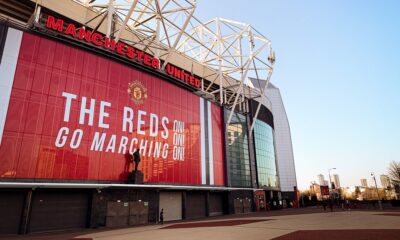Man Utd General News
Are You A Supporter Or A Fan?
After Manchester United’s first loss in 30 Barclays Premier League matches, some of their fans, not supporters, let loose with some verbal garbage. It was not a very convincing performance from the Reds by any stretch of the imagination, and losing is never anything anyone should take easily, however, for the way some of the fans that were questioning the intentions and qualifications of United was down right despicable.
The shocking statements that were being spewed out brings up a much-needed debate about the difference between being a supporter or a fan of a club, and the latter or two showed their true colors after United’s disappointing loss. The disparaging remarks, which ranged from either calling the club a “f*****g disgrace,” or to challenging Sir Alex Ferguson, who is the successful manager in English football, were a real eye-opener since they all claimed they are devoted supporters.
It is very apparent that this disillusioned portion alleged supporters have never been given the lesson on what what it means to actually support a football club, especially one of the magnitude of Manchester United. So what is the real difference between a supporter and a fan?
The major difference between the two, which is often mistaken as the same thing, is how much a person actually concerns themselves about learning the legacies, rivalries, the traditions and, most importantly, history of that particular club. People will refute this by saying that it is just the difference terminology, and, to be honest, that is just it, but it is learning the appropriate ways, or words, to describe the club you support.
Words that are often used to describe a supporter are: passionate, dedicate and loyal, and, most importantly, embodying everything that the club is all about. Supporting a club not only demands unconditional love, but it requires that person to also honor and respect traditions, which is something a lot of fans these days do not take into consideration.
Fans, which is short for fanatics, is simply someone who casually watches a match, but does not have the club’s best interest at heart – no matter the result. There is no questioning the fact that Sir Alex Ferguson has upheld level of standards of excellence at United, but if the club falters a portion of the fan-base start ridiculing either the players or the manager.
While it is okay to critique or call out a certain player for not performing to their ability, these fans, if they were supporters, would have already learned that they must take the good with bad. Everyone should know that success cannot be fully enjoyed, or appreciated for that matter, unless the supporter has experienced tough times, and, to be honest, most modern-day United supporters have never seen the club suffer for more than a period of two years.
Unequal
Manchester United is one of the world’s best-supported clubs with approximately 333 million fans worldwide, but not all of them embody the club for what it was, is and will be. If a United supporter from Manchester, or in England, decides to move abroad, he never loses his allegiance for the club he supports, and there is living proof of that with some Reds throughout America.
However, a lot of these new-aged fans do not realize that football is not like any other sport, because no matter whom you support, it should become more like a religion than anything else. As people will witness following conclusion of Super Bowl XLV, fans will jump on the Green Bay Packer bandwagon just because they are the new, hottest franchise.
However, one thing that Manchester United should never be called is a franchise, because the Red Devils are a football club, or as Sir Alex referred to it as the other day, “a family.”
Flavor
Yes, football is only becoming more and popular in the United States, because of media outlets such as Fox Soccer Channel and ESPN, which is England’s version of Sky Sports, showing more and more games every weekend. With the recent media indulgence into showing the Premier League on this side of the Atlantic, Americans are now afforded the chance to pick and choose which English football team that would like follow, which is another thing that they cannot comprehend, either.
As a supporter, you do not pick your club – the club picks you. To be fair, it is much harder for people to support a club like Wigan Athletic or Wolverhampton Wanderers, because they are not on the television week in and week out, so they tend to choose Manchester United, Arsenal, Chelsea or Liverpool.
When Manchester United toured America this passed summer, some of the people who attended the matches should be considered supporters based on the fact that their either had memorabilia of a rival team, or referred to the club as “Man U.”
It must have been very hard when Gary Neville, who just brought to an end his dignified 19-year playing career with United, came over a few years back, and had people with Arsenal or Liverpool shirts wanting to get his autograph. A lot of these new fans have been attracted to the club because of the popular players like David Beckham, Cristiano Ronaldo or Wayne Rooney, but they tend to leave when that certain play leaves.
While it is good to have highly-marketable players at your club, you would rather see supporters supporting a player that stands for what Manchester United was built on: determination, hard work, tradition and honesty. Another glaring difference between the two is that a supporter values the color of the shirt and crest on the front of it, while a fan values name on the back more.
“I Pledge Allegiance To The Crest Of Manchester United Football Club, And To The Colors For Which It Stands: One Supporter Under Sir Alex Ferguson, United With Pride And Success For All.” – The United Religion, 2007
In closing, ask yourself this question: If Manchester United was to be relegated to the third tier of English football, would you still honor, value and uphold the history and traditions the club has stood for over the last 133 years?
Submitted by The United Religion


















